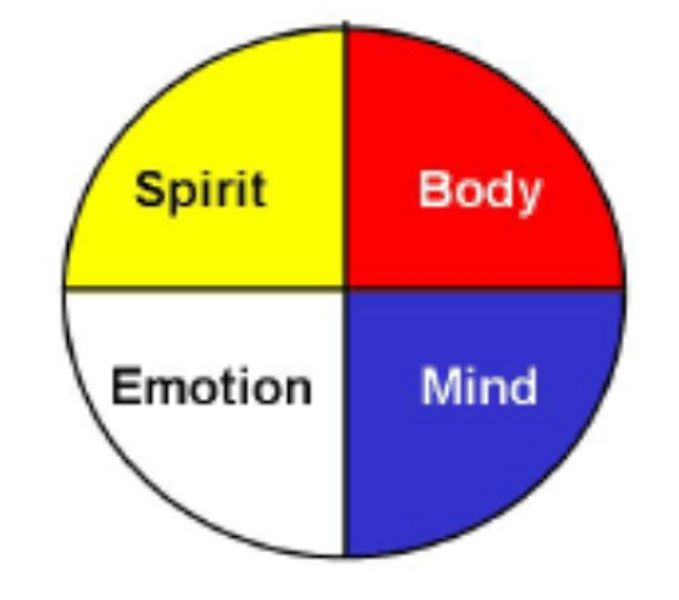Spirituality - Examples
American Indian Medicine Wheel

Most of the pages within NACES integrate the Medicine Wheel (Spirit, Body, Emotion, Mind) and some also include "Social" aspects to health and well-being. Although some tribal nations prefer the "Circle of Life" the NACES Team had to select a model and both were important and had similarities. The NACES Team selected the Medicine Wheel and hopes the tribal members who prefer the "Circle of Life" are able to visualize the relatedness to the Circle and still benefit from the Medicine Wheel content on the webpages.
"The Spirit" of the Medicine Wheel
Cancer patients of all cultures typically find great comfort in embracing their individual spirituality. For American Indian and Alaska Native patients, almost all who have been involved with NACES have benefited greatly from their spiritual strengths. Even AIANs who have allowed their spiritual practices to lapse in years prior to the cancer diagnosis, frequently find greater strength, hope, healing and recovery when they become more involved in the spiritual beliefs again.
"The Body" of the Medicine Wheel
Your search for resources can have an affect on your body. Also, how your body is feeling during and after cancer treatment can make a difference in your ability to search for the resources you need.
Fighting cancer is very hard on the body. The work it takes to get some of the resources you need can be extra hard on top of that.
Some of the possible side effects of cancer and cancer treatment on the body that can make it difficult to search for resources are:
- Fatigue
- Pain
- Surgical incisions
- Muscle aches and weakness
- Lymphedema
- Vision changes
Each of these side effects and others can interfere with your search for resources. For example:
- You may be too tired to make several phone calls and to take notes on the information you find out.
- You may be too sore after surgery to sit and hold the phone up to your ear.
- If you have lymphedema, your fingers may be swollen which may make it hard to dial or push the buttons on the phone.
- If you have vision changes you may have a hard time reading the list of places the social worker gave you to call for help.
There are things you can do to help make the search for resources easier on your body.
- If you are sore from recovering from surgery you may want to arrange some pillows to prop you up and to support your arm while you are holding the phone.
- If you are having vision problems or difficulty focusing your eyes on small print, try using a small magnifying glass. If you are using a computer, under "The Top Menu" select "View", then from the "Pull Down Menu" select "Text Size" and then select a text size you would like.
- Don't do too much at one time.
- If you are very tired, try calling about resources at the time of day that you feel strongest. Make no more than 2 to 3 short calls or 1 longer call at a time.
- If you are beginning to feel too tired or not well during the middle of a call, be sure ask for and write down the first name of the person you are talking to. Tell them you are getting too tired to continue the call and that you will need to call them back another time.
- If the effects of cancer or cancer treatment on your body are making it difficult to do the work needed to find resources, ask someone else to make calls for you. People often have a hard time knowing how to help and support a cancer survivor. This is one thing you can ask someone else do for you!
"The Emotion" of the Medicine Wheel
Emotions during the cancer experience can fluctuate quickly and frequently (happy to be alive to feeling anxious or stressed, depressed and frightened or lonely to hopeful and calm). Emotions affect how your body reacts to others and how it reacts to cancer treatments. Talking with the local traditional healer or a counselor has helped may AIAN cancer patients help their emotions regain balance.
"The Mind" of the Medicine Wheel
Cancer treatments, especially some combinations of chemo drugs, can affect how clearly you are able to focus or concentrate. You also may have memory issues or experience bouts of confusion. These are side effects from the cancer treatments. These side effects will gradually lessen, but some, such as "chemo brain" or foggy feelings you have in your brain can take 2 years to subside. Let your traditional healers and Western Medicine healthcare providers know you are having these issues.